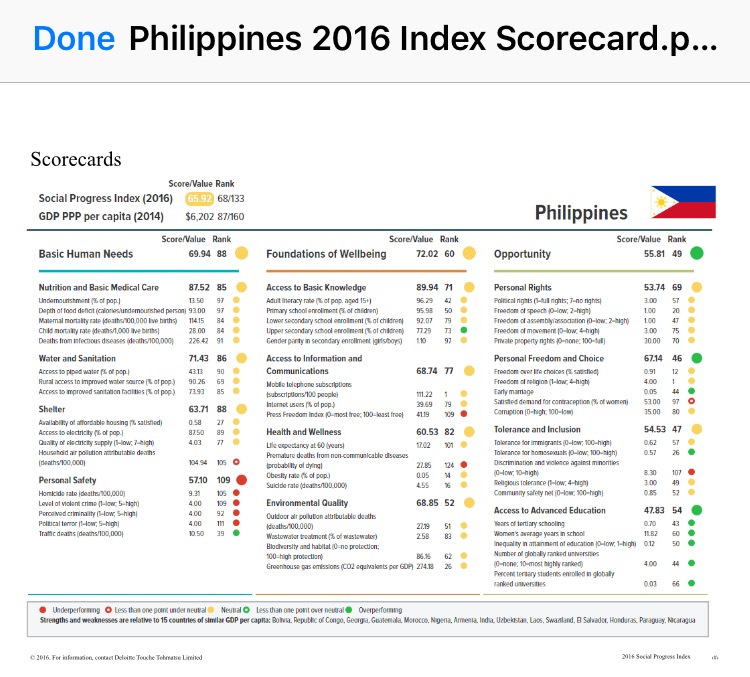
This was how PH fared in various metrics under SPI 2017.
The Philippines ranked 68th out of 128 countries evaluated in terms of progress in addressing basic human needs and well-being as well as creating opportunity for citizens, based on the 2017 Social Progress Index (SPI).
Based on this year’s SPI – published by the US-based non-profit Social Progress Imperative with support from Deloitte and in collaboration with Michael Porter of Harvard Business School and Scott Stern of MIT – the Philippines garnered a score of 67.1 out of the highest possible grade of 100.
Last year, the Philippines was ranked 68 out of 133 countries with an overall score of 65.92. At 68th place, the country is deemed to be within the “upper middle” of the pack.
Comparing the ASEAN countries ranked in the 2017 SPI, the Philippines is ahead of Indonesia (79th), Myanmar (96th), Cambodia (98th), and Laos (99th) but it lags behind Malaysia (50th) and Thailand (62th).
Denmark is this year’s top performing country, followed by Finland (2nd), Iceland (3rd), Norway(4th), and Switzerland (5th).
While the Philippines’ ranking is unchanged from last year and the score only modestly higher, the newly released 2017 SPI edition found that since 2014, the country has shown marked improvement in providing shelter. Improvements were also seen in all three broad measures of basic human needs, foundations of wellness, and opportunity, as well as in 10 of the 12 sub-categories reported in this year’s index.
For the Philippines, shelter – which includes measures of availability of affordable housing and access to electricity – has shown the biggest improvement among the 12 sub-categories reported by the index, coming in with an increase of 2.24 points from 2014 to 2017. This is followed by improvements in the areas of access to advanced education and personal freedom and choice, showing an increase of 2.02 points and 1.67 points respectively over the four-year period.
High scoring areas include access to basic knowledge (92.61) and nutrition and basic medical care (88.65). Access to advanced education (47.56) and the broader measure of opportunity (58.23) are areas where the Philippines is over-performing as compared with countries with the same gross domestic product (GDP) purchasing power parity per capita.
Areas where the country did not perform as well include tolerance and inclusion (55.38) and health and wellness (61.04), both showing a drop of 1.36 points and 0.12 points, respectively.
“There is always room for improvement where social progress is concerned, particularly in today’s rapidly evolving world where issues, including social ones, are fast-moving and fast-changing. To secure a bright economic future for the Philippines, its people, its businesses and its government will need to work hard together to do even better in the areas that have improved over the four years, and focus on improving areas that did not do so well in this year’s index,” Eric Landicho, managing partner & chief executive officer of Navarro Amper & Co, the Philippine member of the global Deloitte network said in a press statement.
Based on global findings, while quality of life is improving across the globe, world leaders are seen confronting two deeply troubling trends: declining personal rights, personal safety, and tolerance and inclusion, as well as slow and uneven progress worldwide.
The 2017 SPI found that since 2014, personal rights – which include measures of political rights and freedom of expression – declined in more countries than it improved.
Improvements in personal safety over the last four years also remained stubbornly elusive. There were as many countries that experienced a decline in this metric as those that saw an improvement in this category of social progress, which spans political terror and traffic deaths.
On the index, countries diverged the most when it came to tolerance and inclusion – a measure that includes acceptance of immigrants, homosexuals and religious minorities. Though relatively stable on average, country-level scores are the most volatile in the index.
Generally, the research suggested that world is underperforming on social progress compared to what the average GDP per capita suggests is possible. Despite progress in the last decade, the world is seen failing most on water and sanitation (access to piped water and improved sanitation facilities) and access to basic knowledge (adult literacy and secondary school enrollment).
Despite having the greatest wealth, largest populations and strongest regional influence, the research suggested that G20 countries like France, the US, Saudi Arabia, Russia, Turkey and China had been largely unsuccessful at improving social and environmental outcomes and continued to underperform compared to what their GDPs suggest is possible.
Social Progress Index 2017 – country ranking

